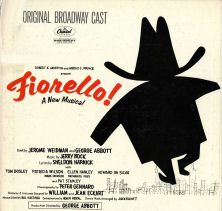So I’ve had this song stuck in my head ever since Mark Evanier posted it as his video link of the day on Friday. This is “Little Tin Box,” from Jerry Bock and Sheldon Harnick’s musical Fiorello:
I was in a community theater production of Fiorello* back in the 1990s and got to sing this one, which was great fun — fun to rehearse, fun to perform, and fun for the audience.
It’s a character song, sung by the chorus of Tammany Hall political hacks desperately defending their corruption from LaGuardia’s reforms in early 20th-century New York. The hacks take turns pretending to be the prosecutors and witnesses in those anti-corruption trials. Each, in turn, is asked to explain how it is that a public servant on a limited income has been able to afford extravagant luxuries:
Mr. X, may we ask you a question?
It’s amazing, is it not,
That the city pays you slightly less than fifty bucks a week,
Yet you’ve purchased a private yacht?
And then each, in turn, lampoons the implausible defense repeatedly attempted in those trials. It was simply a matter of frugality and prudent personal finance:
I am positive your Honor must be joking!
Any working man can do what I have done.
For a month or two I simply gave up smoking,
And I put my extra pennies one by oneInto a little tin box,
A little tin box
That a little tin key unlocks.
There is nothing unorthodox
About a little tin box. …
It’s funny stuff. I can explain that new Rolls Royce, your Honor, I collected nickels by taking empty bottles to the grocer. I skipped lunch. I carefully stewarded my pocket change.
The hacks’ defense is ridiculous — in the song and in reality — because it can’t overcome the basic arithmetic of personal thrift. It simply doesn’t add up. If you’re making $50 a week — $2,600 a year, or about $46,000 in 2014 dollars — then no matter how penny-pinching and frugal you may be, you won’t ever be able to save more than $50 a week. Your income is always going to be the upper limit on your savings and investments. Even if you give up all vices and luxuries, skip lunch, and faithfully collect all the deposits on your recyclables, it’s not possible to ever put more than that original $50 a week into your little tin box.
 Everybody understands that when it comes to political corruption. That’s why we laugh at the foolish audacity of this flimsy lie from such bribe-taking grifters.
Everybody understands that when it comes to political corruption. That’s why we laugh at the foolish audacity of this flimsy lie from such bribe-taking grifters.
But when it comes to the working poor, everybody seems to forget the absurdity of this foolish arithmetic. The minimum wage is $7.25/hour — in constant dollars, that’s less than a third of the $50 a week these corrupt politicos were being paid in 1934. That’s $290 a week and only $15,000 a year.
And yet every day in America, people making three times as much, or ten times as much, line up for their chance to lecture these low-income workers on the merits of thrift, frugality and personal responsibility. Get rid of your cable subscription, they say. Keep your tires properly inflated. Turn the lights off when you leave the room, lower the thermostat, bring a bag lunch, learn to cook rice and beans, and check some Dave Ramsey books out of your local free public library.
Whatever the merits or demerits of such advice, and no matter how careful the adviser is to avoid victim-blaming condescension, the arithmetic is the same. It doesn’t add up.
The problem for the working poor is not that their personal expenses are too high, but that their income is too low. That doesn’t change even if they cut every expense. The arithmetic is the same whether they skip lunch once a week, or twice a week, or if they transcend human biology and forgo eating altogether.
If your income is $15,000 a year, then you will never be able to save more than $15,000 a year by being “responsible.” No amount of frugality, thrift and responsibility will ever allow you to put more than that into your little tin box.
Anyway, enjoy the video above. I hope the song doesn’t get stuck in your head, but I wish it would get stuck in Dave Ramsey’s head, and in Bill O’Reilly’s head, and in the head of every other innumerate blowhard preaching their absurd, victim-blaming BS to people who don’t need a lecture, just a damn raise.
– – – – – – – – – – – –
*That was Dorothy’s Fiorello. She was a terrific old broad — in the best sense of that term, the old-movie sense in which it was a hard-won honorific for tough women of a certain age whose good side it was best to stay on.
Fiorello was the first play Dorothy Trauberman was ever in, and so she decided it would be the last play she would direct. She wasn’t retiring, she was dying. Her doctors told her in August that there was nothing more that could be done to stop the inevitable spread of her bone cancer and that she had, at most, six months to live. She informed them that this would not do. She was directing Fiorello in the spring and would need to reschedule her death for some time after April. “I’m going to do this show and then I can die,” she told them.
And that’s what she did. She died two weeks after the show closed. I recited the Kaddish at her memorial service (as per her instructions — she insisted I be off-book and she didn’t want anyone calling for lines at her service).
















